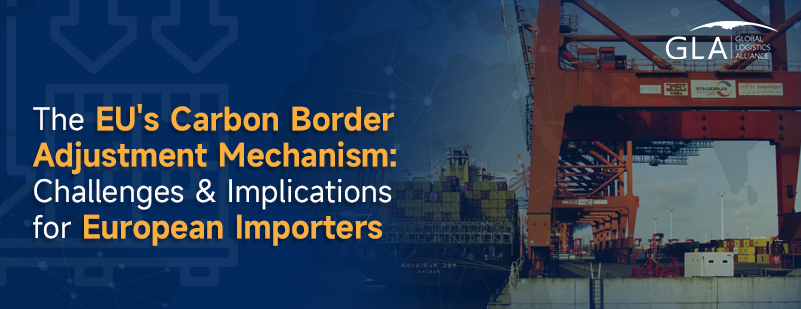Welcome to GLA! Leading the global logistics alliance.


Your location:Home > News > The EU's Carbon Border Adjustment Mechanism: Challenges and Implications for European Importers
Time:2023-12-04 Publisher:Kevin Num:6366

The European Union's Carbon Border Adjustment Mechanism (CBAM), set to launch on October 1, is a significant policy initiative aimed at addressing carbon emissions associated with imports. This mechanism is poised to have far-reaching effects on European importers, including anticipated price rises, administrative hurdles, and potential economic consequences. In this article, we will explore the primary takeaways from the CBAM implementation and its implications for businesses in Europe.
A report by The Conference Board highlights that 83 percent of European respondents, primarily senior procurement and sustainability executives, anticipate price increases as a direct result of CBAM. The goal of CBAM is to impose tariffs on carbon-intensive imports, aligning their costs with those of EU-produced items. Consequently, 75 percent of respondents expect CBAM to influence their future purchasing decisions. This expected price surge will undoubtedly impact the cost dynamics of various industries.
The initial phase of CBAM will require importers of products falling into six regulated categories, including iron & steel, cement, and fertilizers, to report their carbon emissions to EU authorities. This mandate is set to take effect immediately, causing prices for these items to rise even before tariff collection commences in January 2026. Importers must prepare for this swift impact on their pricing strategies.
One of the significant challenges that European importers will face is the potential for logistical bottlenecks. Some EU nations have limited administrative capabilities, making it difficult to efficiently implement CBAM. A critical bottleneck is the shortage of qualified 'verifiers' responsible for validating importers' carbon emissions declarations. Several EU member states, including Belgium, have only a few verifiers, while some have none at all. This scarcity can lead to delays and compliance issues for businesses.
Differences in customs efficiency levels among EU member states may pose additional obstacles for importers. For instance, Italy, the largest EU importer of iron and steel, features a protracted customs declaration process. This inefficiency could potentially cause import delays and impact supply chains. Importers will need to navigate these disparities effectively to minimize disruptions.
The EU is expected to relax certain accreditation rules for verifiers in response to the growing demand for their services. However, this may not completely address the issue, as many verifiers are already operating at full capacity. Some verifiers are even declining new requests to audit emissions from European-based manufacturers. These challenges must be addressed swiftly to ensure the smooth implementation of CBAM.
Unless rapid action is taken to resolve administrative challenges, CBAM could have adverse economic consequences for the European Union. The six regulated goods categories constitute a significant portion of EU imports, with a total value of €133.21 billion. The potential for price increases, supply chain disruptions, and administrative hurdles could impact the overall economic performance of the EU.
CBAM is designed to bridge the price disparity between imports from non-EU countries lacking carbon-pricing systems and EU-manufactured goods. Importers from countries with their own carbon pricing systems may potentially be exempt from CBAM fees, contingent on comparisons with the EU's Emissions Trading Scheme. This aspect highlights the importance of understanding import origins and the potential for exemptions.
The introduction of the EU's Carbon Border Adjustment Mechanism is poised to trigger price hikes and logistical complexities for European importers. These challenges could have significant consequences for supply chains and the European economy at large. The impact will vary based on import origins and the readiness of customs and verification procedures in different EU member states. Importers are advised to prepare for these changes proactively and assess strategies for meeting demand in the months ahead. Adapting to the new carbon pricing landscape will be essential for maintaining competitiveness in a carbon-conscious world.
Prev:Welcome! Membership Renewal from India ———— Yatra Online Freight Services Private LimitedNext:Welcome! New Golden Member from UAE ———— Meridian Express Logistics LLC
Recommended Membership
Latest News